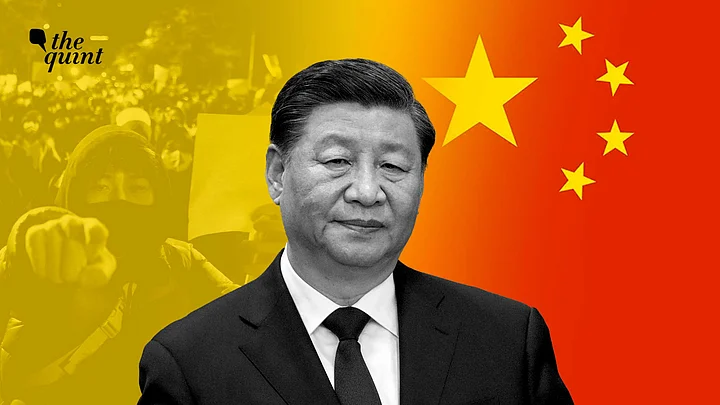(This is Part Two of a series focusing on the the current crisis unfolding in China and its global implications.)
In an unprecedented development since the Tiananmen Square incident in 1989, China is witnessing a series of pitched battles across the country between the commoners and the authorities on the debilitating restrictions imposed on people for the past three years in the name of controlling the pandemic.
At the last count, the protests have spread to over 25 cities and over 80 universities, totalling over 50 since the last week of November when nearly a dozen residents were charred to death at Urumqi in Xinjiang in a locked-down high-rise building that caught fire.
The spread of such protests geographically is for the first time in China since the Tiananmen Square incident, although the 1989 movement attracted more protestors.
China is witnessing a wave of protests since the Tiananmen Square incident in 1989.
Despite political tensions between rival factions in the communist party, the protests have not divided the crucial party centre yet.
The current protests are against the excessive political control exercised by the authorities in the name of pandemic control for the past three years.
While Xi today enjoys an absolute majority in the crucial party hierarchies, the protests tend to undermine his political authority and in the medium term, his legitimacy.
COVID Protests Echo Tiananmen Square Movement
Moreover, the communist party was split vertically between pro-student leaders like Zhao Ziyang and hardliners like Li Peng. Today, while political tensions exist between rival factions in the communist party such as the “New Zhijiang Army” of Xi Jinping and the Communist Youth League of Hu Jintao and Li Keqiang, the protests have not divided the crucial party centre yet.
China witnessed “mass incidents” periodically after the Tiananmen Square incident in 1989. According to official estimates, over 5500 such incidents were reported in 1991, rising continuously to over 87,000 in 2005 and to 1,80,000 in 2010. However, China’s Premier has discontinued providing such statistics anymore.
The protests continued as the economic growth rates declined in the past decade from nearly 10 percent to an estimated 3 percent for this year. The crisis of confidence in the party-state is also that while it promised to maintain economic growth rates if students do not question the party’s legitimacy, such high growth rates have vanished in thin air.
While a majority of the “mass incidents” were against the grievances related to the withdrawal of subsidies and the retrenchment of the party-state duties, the current protests are against the excessive political control exercised by the authorities in the name of pandemic control for the past three years.
Pandemic Control or Political Crackdown?
Given the nature of the surveillance state in China and other repressive mechanisms like the “social credit” system, it would be hard to think of scores of people joining any protest in China today. However, the fact that many people ranging from students to workers, ethnic minorities to Han Chinese were participating in large numbers not only indicated that COVID control mechanisms have enraged a large section of the population but also the ability to express openly their dissent to the top powers.
Also, despite the domination over the cyber domain and curbs on social networking sites in China, many have utilised such channels to assemble and organise protests across the country. Even though such protests remained decentralised and devoid of backing, funding, and nationwide networks, the fact that they were able to spread like wildfire indicates the growing political dissent in China and the limitations of the authoritarian regime.
The COVID prevention efforts provided a chance to furthering the intrusive policies of the party-state and controlling people with arbitrary procedures, unpredictable lockdowns of whole localities and cities without providing for basic provisions of food and sanitary facilities.
For the newly anointed Xi Jinping with a third term at the 20th party congress this October, the widespread political protests across the country are challenging if not unnerving. While Xi enjoys an absolute majority in the crucial party hierarchies, the protests tend to undermine his political authority and in the medium term, his legitimacy.
What Is Xi’s Strategy To Retain His Term?
Even though there is no imminent threat to Xi’s political leadership, despite some slogans in this regard by the protestors, he is expected to broad-base his appeal to the public for any meaningful solution to the problem at hand. Xi had earlier jettisoned rival factional leaders like Li Keqiang, Wang Yang, Hu Chunhua, and others from gaining a foothold in the politburo standing committee. Now, he needs coalition partners to douse the protests across the country.
Xi also faces the dilemma of the intensity of the crackdown on the protestors and could easily stamp out dissent, given the overwhelming internal security build-up in China for the past several decades. In fact, today, China has more internal security budgetary allocations than on the defence sector. The nature of surveillance has also been sharpened. However, the more the repression, more is the intensity of protests likely in the current context, thus, creating regime security anxieties.
In such a scenario, rethinking the “dynamic zero-COVID” policies earlier reiterated at the 20th party congress in October, might be Xi government's best bet.
To Read the Part One Of This Series, Click here
(Srikanth Kondapalli is Dean of School of International Studies at Jawaharlal Nehru University. This is an opinion article and the views expressed are the author's own. The Quint neither endorses nor is responsible for them.)
